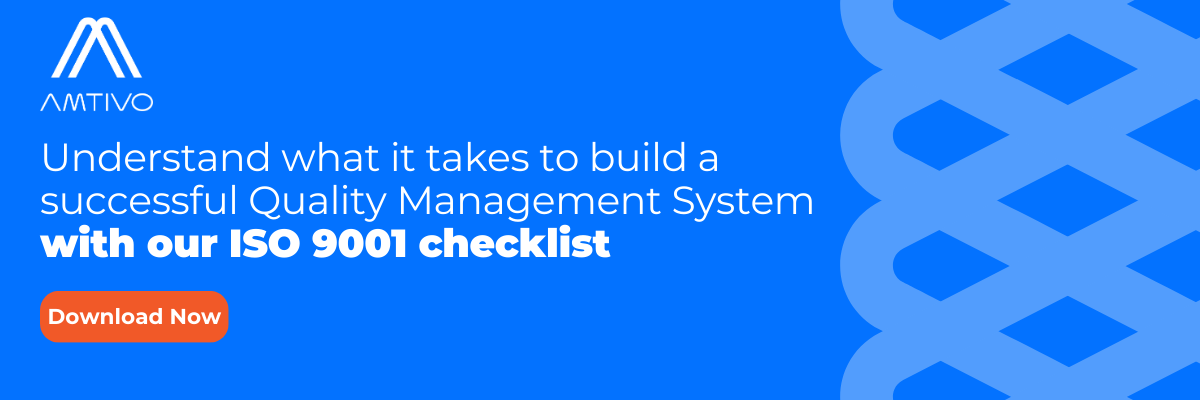A Quality Management System (QMS) is a structured set of processes and policies that helps businesses systematically manage and satisfy their customers’ needs and expectations. It does this by prioritizing the quality of the organization’s products and services.
Getting certified to standards like ISO 9001 (quality management) or ISO 13485 (quality management for medical devices) shows you are serious about delivering quality products and services. Achieving ISO certification confirms that your QMS has been implemented in line with internationally recognized quality management principles.
Does it make a difference? According to Harvard researchers, it does. They found that California businesses that achieved ISO 9001 certification had higher rates of corporate survival, sales and employment growth.
A QMS can strengthen an organization by supporting quality consistency, regulatory compliance and continual improvement. It involves input from all levels, encourages all employees to be actively involved and fosters teamwork.
These are just a few of the benefits of a Quality Management System—to learn more, read on.
Key Benefits of Implementing a QMS
A Quality Management System can improve every part of your business. Here are some ways a QMS can boost your efficiency, reputation, and growth.
Consistent Quality
Maintaining a high level of quality can be challenging without a framework to support your business operations. A QMS standardizes processes so that every product or service consistently meets established quality criteria.
Implementing clear procedures and guidelines helps organizations maintain uniformity across all operations, which is crucial for product quality. Standardization supports consistent outcomes and improves operational efficiency by reducing variability and errors.
So, by providing a reliable framework for employees, a QMS leads to predictable outcomes and builds a higher level of trust in an organization’s products or services. This consistency can also help businesses build a strong reputation, as customers appreciate consistent quality and reliable service.
Saves Money
One of the most compelling benefits of an efficient QMS is its ability to significantly lower expenses by reducing errors, waste and rework.
By streamlining processes and identifying inefficiencies, a QMS can minimize the resources spent on correcting mistakes and managing defects. This efficiency translates to substantial cost savings, as waste is reduced and productivity is improved.
With systematic approaches to problem-solving and continual improvement, every step in the production process is made as cost-effective as possible.
These savings can also allow businesses to spend more strategically, supporting innovation and development and, ultimately, improving financial performance

Increased Productivity
Implementing a QMS can increase productivity for any business. By reducing bottlenecks and optimizing resource allocation, an efficient QMS means smoother workflows and faster turnaround times. Employees can focus on productive tasks rather than troubleshooting or addressing recurring issues.
This efficiency allows businesses to meet customer demands more quickly and effectively. Plus, by fostering an environment of continual improvement, a QMS empowers employees to contribute to productivity gains with innovative solutions, benefiting business growth.
An ISO-certified QMS offers a structured management system that enhances productivity through defined processes and continual improvements, with standards like AS9100, AS9110, and AS9120 specifically enhancing efficiency and quality control in the aerospace industry.
Higher Customer Satisfaction
A QMS can play a vital role in improving customer satisfaction by supporting the consistent delivery of high-quality products and services. With standardized processes, businesses can consistently meet or exceed client expectations, leading to happier customers.
Delivering reliable products and services builds customer trust and strengthens brand reputation. As customers encounter fewer issues and enjoy consistent quality, they are more likely to return and recommend your business to others.
An ISO 9001-certified QMS emphasizes gathering customer feedback and making necessary adjustments, supporting ongoing operational improvements. This customer-centric approach can foster loyalty and help to build long-term relationships.
Increased Market Share
Achieving ISO 9001 certification for your QMS can significantly boost a company’s competitive edge by opening it up to new market opportunities.
Many industries and clients require certification as a prerequisite for doing business, making an ISO-certified QMS an essential tool for market expansion.
For example: certification to ISO 9001 demonstrates a commitment to quality and continual improvement, which can attract new customers and partners.
The credibility associated with QMS certification can also enhance a company’s reputation, making it more appealing to potential investors and collaborators.

Supports Business Growth
A QMS is essential for scalable growth, as it enhances efficiency and equips businesses to tackle new challenges effectively. As organizations expand, the structured approach of a QMS helps manage increased complexity while helping businesses offer consistent quality.
An ISO-certified QMS, such as those certified to ISO 9001, ISO 13485, or IATF 16949 (which defines the QMS requirements for the automotive industry), strengthens this adaptability through a standardized management system standard that’s recognized internationally. This allows businesses to respond quickly to changes in demand or market conditions.
By encouraging a culture of continual improvement, an ISO-certified QMS encourages innovation and growth while maintaining high standards. The strategic insights gained through a QMS can also help guide decision-making, positioning businesses for lasting success.
Costs vs Benefits—Is Implementing a QMS Worth It?
When businesses are considering whether to implement a QMS, it’s important to weigh the costs against the potential benefits. While there are initial expenses for training, documentation, and certification, the long-term advantages make those expenses worthwhile.
A QMS, particularly one that is ISO-certified, offers many benefits. Alongside reducing waste and errors, it provides the appeal of streamlined processes and cost savings. Happier customers and a stronger market reputation can boost revenue. So, while there are upfront costs, ongoing improvements in efficiency and quality can provide a solid return on investment in the long run.
Implementing a Quality Management System is more than just a way to meet regulatory requirements. A QMS is a strategic tool that can drive business success. By fostering consistency, reducing costs, and enhancing productivity, it provides a comprehensive framework that supports business growth and helps organizations to increase their market share.
For a deeper understanding of how a QMS can benefit your business and to explore the next steps for implementation, read our expert guide: What Is a Quality Management System?
Learn more about ISO 9001 certification—get a quote today or contact our team of experts to discuss your needs.






